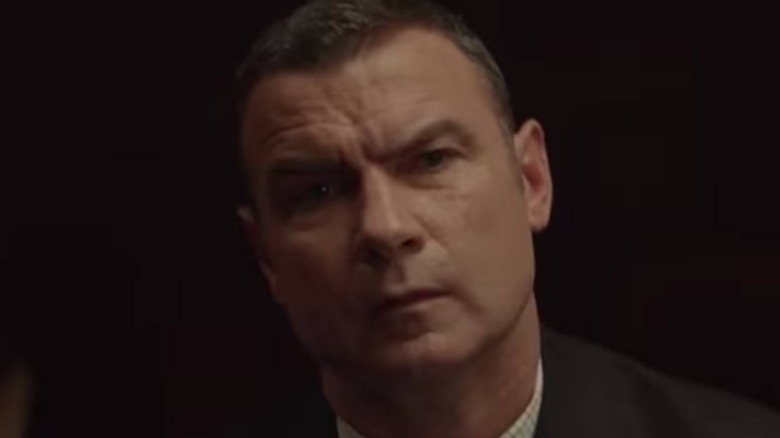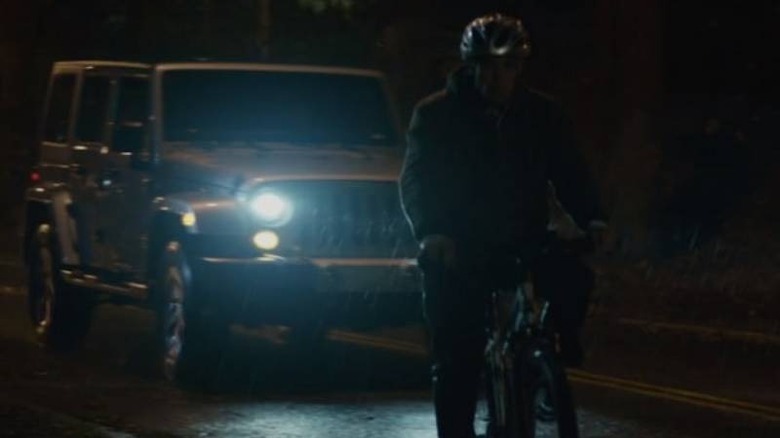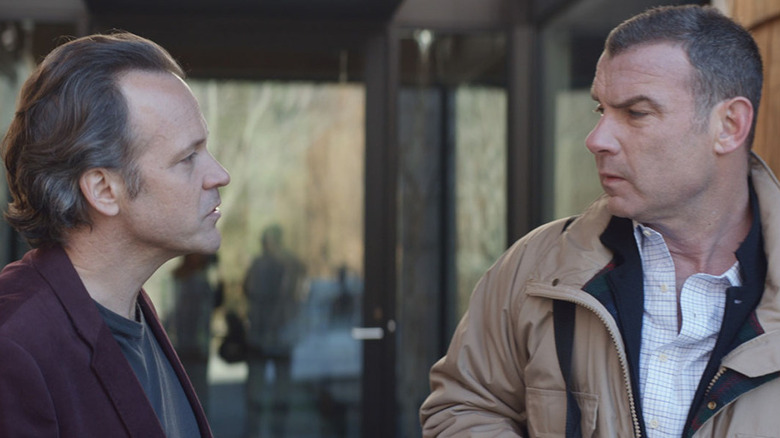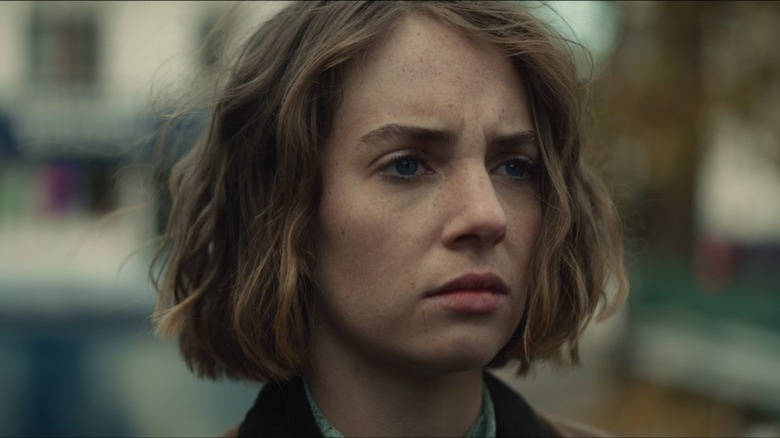The Ending Of Human Capital Explained
With a forlorn title like "Human Capital," you should go into the 2020 movie with expectations of danger and demise. That's precisely what happens in the film, which has an opening scene of a bicyclist getting sideswiped by a vehicle and doesn't get much better from there.
"Human Capital" jumps around to different characters' perspectives, so it's definitely not the kind of movie you can watch while scrolling through your phone. When young Shannon (Maya Hawke) starts dating her wealthy classmate Jamie (Fred Hechinger), the plot kicks off. Through this relationship, Shannon's father, Drew (Liev Schreiber), comes across an opportunity to potentially enrich his life by securing a loan of $300,000 to give to Jamie's father Quint (Peter Sarsgaard). Things start taking a downward spiral as both families begin to see their lives unravel.
Watching this movie is like watching an impending train wreck. You know a disaster is around the corner, but you can't stop yourself from watching as it all unfolds. And in case you have any questions by the finale, here's the ending of "Human Capital" explained.
Who hit the bicyclist?
The movie opens with a mystery. Who was behind the vehicle that hit a waiter biking his way home from work? The puzzle pieces appear to fall in place throughout the movie, and for a while, it looks like Quint's son, Jamie, was behind the hit. We get the story that he was drunk at a party and somehow found his way home, but something's not quite right with his version of events. It's not until the final third of the movie that we learn what truly happened when we get Shannon's perspective.
Shannon started seeing another boy, Ian (Alex Wolff), after breaking up with Jamie in the previous few days because he was gay. She gets a call one night from Jamie at the party, and he needs a ride back home because he's far too drunk to do it himself. She drives Jamie in her car while Ian takes Jamie's Wrangler. In classic teenage rebellion, Ian goes too fast down the road and inadvertently hits the bicyclist. It may have been an accident, but there are serious repercussions. And if it wasn't for Shannon leaving her laptop open, it's entirely possible Jamie would've taken the blame for the hit-and-run.
Where does everyone stand by the film's end?
Drew goes to the Mannings with the information necessary to exonerate their son in exchange for the $300,000 he invested in Quint's company at the beginning of the film. Carrie (Marisa Tomei) says it's a done deal, and apparently, Drew held up his end of the bargain because we next find Shannon coming across a police presence at Ian's house. True to his word, Ian tried to take his own life in lieu of going to prison, but he survived, and the next we see of him, he's behind bars.
Over the course of a few days, everyone's life becomes a little worse or outright destroyed. Drew puts his family in dire financial straights and comes out of the situation with less money than when he began. The Mannings have their livelihood put in jeopardy, too, as a result of stock market fluctuations. And, of course, Ian will likely be in prison for the rest of his life. On top of all of that, a man is dead, and if Shannon had just remembered her keys and didn't go to the therapist's office, the bicyclist probably would've still been alive.
With that being said, Ian, the poorest of all the characters with the fewest resources, is the worst off. He's lost his freedom while everyone else moves on from the incident, highlighting the central theme of "Human Capital."
What's Human Capital about?
To understand the theme of "Human Capital," you must first dive deep into the title itself. Human capital as a concept refers to the knowledge and skills a person possesses that makes them an asset to a company or country. We see the term play out during the awards dinner when Quint emphasizes how important it is for Jamie to take home the trophy. Him earning an accolade would increase his human capital, which is essential for high schoolers applying for colleges.
Moreso than that, human capital takes center stage during the climax when it's up in the air whether Ian will take the fall for the hit-and-run. Jamie comes from a wealthy, well-to-do family. It's easy to envision a scenario where he gets off with a few years' probation if charged with the crime. Ian doesn't have access to the same resources. His human capital is significantly less, and as a result, he ends up facing the consequences of his actions and facing severe punishment for the crime.
Ultimately, we see a cascading effect of how capitalism impacts different tax brackets. For the wealthy Mannings, their biggest concern over the economic downturn is being unable to purchase a theater. For Drew in the middle-class, his risky investment threatens his livelihood, home, and future children. And then, Ian, who's the poorest of the bunch, has nowhere to turn to when the walls close in. He hasn't just lost a house; he lost his freedom after becoming entangled with these two families. As "Human Capital" proves, misery trickles down.



